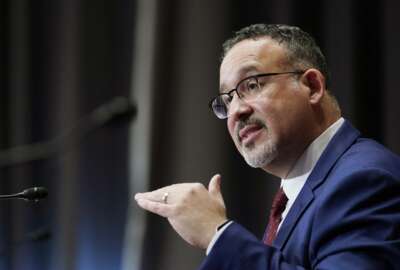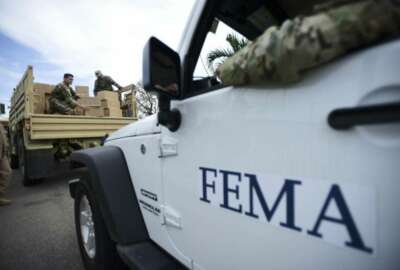
Organizations ask Education Dept to forgive federal employees student loan debt
In today's Federal Newscast, the two largest federal employee unions are calling on the Education Department to cancel student debt for federal employees with 1...
To listen to the Federal Newscast on your phone or mobile device, subscribe in PodcastOne or Apple Podcasts. The best listening experience on desktop can be found using Chrome, Firefox or Safari.
- The two largest federal employee unions are calling on the Education Department to cancel student debt for federal employees with 10 years or more of public service. They’re also calling for a review of the Public Service Loan Forgiveness Program. Employee unions say the program isn’t working. Federal employees and other public service workers who apply for the program are largely rejected. The American Federation of Government Employees and National Treasury Employees Union joined more than a dozen other organizations in writing to Education Secretary Miguel Cardona.
- For only the second time in 60 years, Peace Corps volunteers will serve domestically. Volunteers will assist FEMA at federally supported community vaccination centers across the country. FEMA and the Peace Corps signed an agreement where starting in mid-May volunteers will work in traditionally under-served communities by assisting with language support, administrative, logistical and other needs to support the vaccination efforts. The Corps is recruiting now for next month’s assignments. The first time Peace Corps volunteers were deployed in the U.S. was after Hurricane Katrina in 2005.
- The Department of Veterans Affairs will provide vaccines and enrollment assistance to some employees at the National Archives and Records Administration. VA says the Department of Health and Human Services agreed to give NARA its own allocation of vaccines. VA staff will be responsible for administering them. The agencies reached an agreement after members of Congress raised concerns. Veterans have over 25,000 outstanding requests with NARA for military personnel records. The National Personnel Records Center in Saint Louis is operating at 25% capacity and only processing emergency records requests.
- Three more teams of military medical personnel are headed to Maryland, Tennessee and Wisconsin to help run mass vaccination sites. The 140-person teams from the Army, Air Force and Marine Corps are expected to arrive tomorrow. Once they’re on the ground, each of those “Type 2” teams, as they’re called, are able to deliver about 3,000 shots a day. Each of the sites are state-run, but federally-supported.
- A massive survey finds the overwhelming majority of the Defense Department workforce moved to telework when the pandemic struck a year ago. But some Defense organizations were better prepared than others. The DoD inspector general collected more than 50,000 survey responses. Based on those, it estimated more than 88% of DoD employees transitioned to telework — and almost 56% were teleworking full-time. The survey also shows some DoD components — the Marine Corps, Defense Contract Audit Agency, Defense Information Systems Agency and the Defense Logistics Agency were able to transition to telework without major problems. Others, including the Army, Navy, Air Force, Defense Contract Management Agency, Defense Finance and Accounting Service and Defense Health Agency took more time to get their IT systems ready.
- The IRS more than doubled the number of employees teleworking last year. Nearly 6,100 IRS employees spent at least some time teleworking last September, a 134% increase from the weekly average before the pandemic. The Treasury Inspector General for Tax Administration says the agency also issued more than 18,000 laptops to employees last year. But there were some hiccups. The amount of employee downtime from IT problems doubled or tripled between May and September, compared to baselines the agency reported before the pandemic. (Federal News Network)
- Federal employees have some assurances about their health insurance the next time the government shuts down. The Federal Employees Health Benefits Program is now considered an essential service during future government shutdowns. The Office of Personnel Management finalized a rule declaring it an essential service under the Antideficiency Act. It means federal employees can make enrollment changes to their health insurance even if they’re furloughed for an extended period of time during a future shutdown. Congress mandated this change based on the experience of the last 35-day government shutdown.
- The Defense Department is changing the way it addresses and tracks brain health in the military. The Pentagon will soon release a plan that it is calling a paradigm shift for how it approaches brain health. The strategy moves away from the old way of addressing dangerous exposures to the brain as single, standalone events. Instead, the military health system will continually track and consider exposures over a service member’s career. Physicians will continually monitor troops’ brain health in hopes of mitigating future injuries. Military health facilities have 14,000 to 17,000 visits a month relating to traumatic brain injuries. (Federal News Network)
- More than 40% of military spouses in the workforce lost their jobs during the coronavirus pandemic. The numbers are a huge blow to a demographic that already faces unemployment rates around 25%. That’s according to a new survey by Blue Star Families. The most common reason for the job losses were layoffs or furloughs. Nearly 50% of military spouses said they had to reduce their work hours because they had a child stay at home to attend school virtually.
- The State Department is ready to evolve how it manages its technology contracts. A new request for information is the first step in the State Department’s process to consolidate and streamline its IT services contracts. State’s CIO office said it’s pivoting to a project-based process instead of a technology based one. The new multiple award contract, called Evolve, would replace its Vanguard contracts. State is considering 6-to-10 awards under this 10-year IDIQ vehicle with a four billion dollar ceiling. State would use Evolve to support its enterprisewide IT requirements and to transform to a plan, build, test, run and customer service structure. Responses to the RFI are due April 7.
- Data from other federal agencies helped the Census Bureau wrap up its field operations on-time last year. The bureau said it pulled administrative records from the IRS, Postal Service, Social Security Administration and Indian Health Service to accomplish almost 14% of its non-response follow-up work last year. The bureau expected these records could have helped with up to 22% on its field work, but the IRS’s decision to extend the tax filing season delayed the bureau’s access to these records.
Copyright © 2024 Federal News Network. All rights reserved. This website is not intended for users located within the European Economic Area.
Eric White
Eric White is news anchor and Federal Drive producer at Federal News Network.
Follow @FEDERALNEWSCAST




